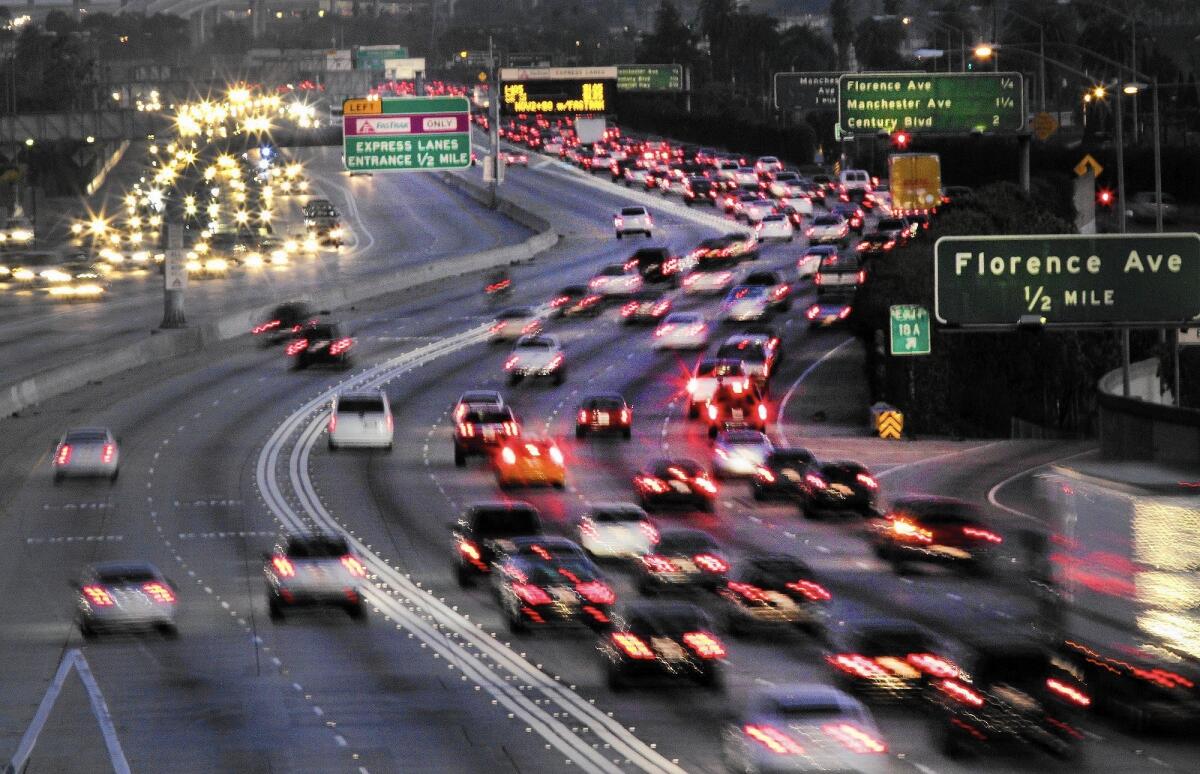Gov. Jerry Brown vetoes off-hours use of carpool lanes on two L.A. freeways

- Share via
reporting from SACRAMENTO — Acting on a spate of bills affecting California motorists, Gov. Jerry Brown vetoed a measure Monday that would have opened carpool lanes on two major Los Angeles County freeways to wider use during off-peak hours.
The bill would have allowed all motorists, outside of commuting hours, to use carpool lanes on the 134 Freeway from North Hollywood to Pasadena, and on the 210 Freeway from Pasadena to Glendora.
Assemblyman Mike Gatto (D-Glendale), who filed the bill, noted that Caltrans has long allowed solo motorists in Northern California to use high-occupancy lanes outside of rush hours.
“Traffic congestion is always bad during rush hour, but there is no need for it to be bad during non-traditional commutes,” Gatto said. “It’s disappointing,” he said of the veto. “But I’m going to continue to work on ways to relieve the traffic burden in Southern California.”
Opening carpool lanes particularly comes in handy when other lanes are blocked by an accident or construction and the carpool lanes are largely unused, the lawmaker said.
But Brown said in his veto message that he had the same concerns about the measure that led him to veto a similar Gatto bill two years ago.
“I continue to believe that carpool lanes are especially important in Los Angeles County to reduce pollution and maximize the use of freeways,” Brown wrote. “Therefore, we should continue to retain the current 24/7 carpool lane control.”
Gatto was hoping the governor had changed his mind. He noted that since the last veto, Caltrans has completed a study showing that, for both freeways, “HOV lane usage drops substantially after the 6 p.m. hour.”
The governor approved three other bills affecting motorists that take effect Jan. 1, including one that will extend the statute of limitations for filing vehicular manslaughter charges in cases of hit-and-run accidents that result in death.
Under the new law, criminal charges need not be filed within three years of such an accident. They may be filed within a year of a motorist being identified as involved in an accident as long as it is within six years of the incident.
“It is important that law enforcement has the ability to prosecute vehicular homicide cases, and provide legal recourse for the families shattered by these events,” said Assemblyman Mike A. Gipson (D-Carson), whose bill the governor signed. “I know how painful it is to lose a family member this way.”
Gipson’s 3-year-old son was killed 23 years ago by a hit-and-run driver who was never caught.
An average 6,000 hit-and-run accidents resulting in injury or death occur annually in Los Angeles County, according to legislative analysts.
Brown also signed a measure that would allow the California Highway Patrol to issue new “Yellow Alerts” on electronic freeway signs, to seek the public’s help in finding motorists involved in hit-and-run accidents. The alerts are similar to Amber Alerts that publicize vehicle descriptions and license plate numbers when children are abducted.
And the governor approved a bill allowing the CHP to use electronic freeway signs for “Silver Alerts” to describe missing persons 65 or older who are developmentally disabled or cognitively impaired.
In all Monday, the governor signed 32 bills and vetoed five, including one that would have barred use of the title “athletic trainer” except by people with a bachelor’s degree and certification by a national group.
Brown wrote in his veto message that he believes the requirements “impose unnecessary burdens on athletic trainers without sufficient evidence that changes are needed.”
Twitter: @mcgreevy99
ALSO
Central Valley sees hope in Rep. Kevin McCarthy’s potential rise
Woman gets 18 months in prison for massive egg donor fraud
‘You idiots! What did you do?’: Grand jury testimony in insurance fraud case is released
More to Read
Sign up for Essential California
The most important California stories and recommendations in your inbox every morning.
You may occasionally receive promotional content from the Los Angeles Times.














